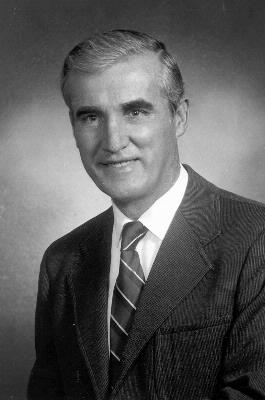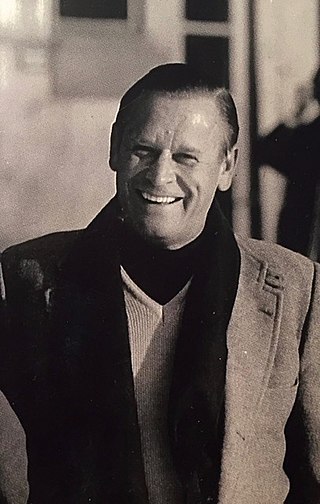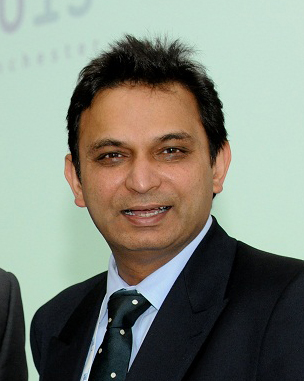Johan Naude is a South African surgeon and urologist. [1] Naude was former president of the South African Urological Association and a pioneering transplant surgeon who worked closely with legendary heart transplant surgeon Christiaan Barnard.
Johan Naude is a South African surgeon and urologist. [1] Naude was former president of the South African Urological Association and a pioneering transplant surgeon who worked closely with legendary heart transplant surgeon Christiaan Barnard.
Johan Naude qualified in medicine at the University of Pretoria in South Africa in 1963. He worked for a year in a mission hospital in the Eastern Caprivi Strip before doing a year's training in anatomical pathology.
He trained in general surgery and urology at Groote Schuur Hospital, where he ran the kidney transplant unit. He was head of the department of urology at the universities of Natal, Johannesburg, and Cape Town.
He is a past president of the South African Urological Association and served on the executive committee of the South African Medical and Dental Council. He served as urology representative on the senate of the Colleges of Medicine of South Africa. He has been visiting professor to numerous academic institutions, including a year at the University College London. He was guest professor at the New York section of the American Urological Association. Naude is the only South African elected to honorary membership of the British Association of Urological Surgeons. During 2003 and 2004 he worked in Mozambique, where he helped to establish a department of urology at the teaching hospital in Maputo.
Surgical procedures devised by him are described in the standard British and American textbooks of urological surgery. He delivered the opening address and chaired the International symposium on "Reconstructive Urological Surgery in the Tropics" in Hawaii in 2004. Naude is a staunch advocate of racial equality, and during the apartheid era, became the first Urology department head at the University of KwaZulu-Natal (now Nelson R. Mandela School of Medicine), the first medical school in South Africa open to all races.

Urology, also known as genitourinary surgery, is the branch of medicine that focuses on surgical and medical diseases of the urinary-tract system and the reproductive organs. Organs under the domain of urology include the kidneys, adrenal glands, ureters, urinary bladder, urethra, and the male reproductive organs.
Lall Ramnath Sawh CMT, FRCS (Edin), FACS is a Trinidadian urologist in the Caribbean and Latin America. Based in Trinidad and Tobago, Sawh was a pioneer of kidney transplantation in the Caribbean in 1988 and is a recognized leader in the field of urology.
Alexander Gershman is a Russian American surgeon He is considered one of the first surgeons in the world to apply the method of laparoscopic surgery and robotic-assisted surgery to urological surgery and is considered one of the world’s leading experts on minimally invasive surgery. After many years teaching, researching and conducting clinical studies on laparoscopic surgery throughout the world, Gershman is in private practice in Beverly Hills, California. His client list includes numerous Hollywood celebrities and professional athletes.

Mahendra Bhandari is an Indian surgeon who has made substantial contributions to the specialty of urology, medical training, hospital administration, robotic surgery and medical ethics. For his efforts, he was awarded the Padma Shri by the government of India in 2000. Bhandari is currently Senior Bio-scientist and Director of Robotic Surgery Research & Education at the Vattikuti Urology Institute (VUI) in Detroit, MI. He was the Symposium coordinator of the International Robotic Urology Symposium. He also has been the CEO of the Vattikuti Foundation since 2010.

Ashutosh K. Tewari is the chairman of urology at the Icahn School of Medicine at Mount Sinai Hospital in New York City. He is a board certified American urologist, oncologist, and principal investigator. Before moving to the Icahn School of Medicine in 2013, he was the founding director of both the Center for Prostate Cancer at Weill Cornell Medical College and the LeFrak Center for Robotic Surgery at NewYork–Presbyterian Hospital. Dr. Tewari was the Ronald P. Lynch endowed Chair of Urologic Oncology and the hospital's Director of Robotic Prostatectomy, treating patients with prostate, urinary bladder and other urological cancers. He is the current President of the Society for Urologic Robotic Surgeons (SURS) and the Committee Chair of the Prostate Program. Dr. Tewari is a world leading urological surgeon, and has performed over 10,000 robotically assisted procedures using the da Vinci Surgical System. Academically, he is recognized as a world-renowned expert on urologic oncology with over 250 peer reviewed published papers to his credit; he is on such lists as America's Top Doctors, New York Magazine's Best Doctors, and Who's Who in the World. In 2012, he was given the American Urological Association Gold Cystoscope Award for "outstanding contributions to the field of urologic oncology, most notably the treatment of prostate cancer and the development of novel techniques to improve the outcomes of robotic prostatectomy."
Ioanel C. Sinescu is a Romanian physician.

John P. Donohue was an American physician. He was the Chairman of the Urology Department and Distinguished Professor Emeritus at Indiana University School of Medicine. He pioneered treatments for testicular cancer, including the nerve-sparing technique. His work with Dr. Lawrence Einhorn led to an increase in cure rate of testicular cancer from 5% to 90%. He studied under Wyland F. Leadbetter. He began his career as a United States Navy officer while serving as the ship's surgeon aboard the aircraft carrier USS Wasp.

John Hartwell Harrison (1909-1984) was an American urologic surgeon, professor, and author. He performed the first human organ removal for transplant to another. This was a pivotal undertaking as a member of the medical team that accomplished the world’s first successful kidney transplant. The team conducted its landmark transplant between identical twins in 1954.

Richard Trevor Turner-Warwick was a British urologist who was internationally known for his work on the surgical restoration of the structure and function of the genitourinary tract. He introduced video-cysto-urethrography.

Roger Sinclair Kirby FRCS(Urol), FEBU is a British retired prostate surgeon and professor of urology, researcher, writer on men's health and prostate disease, founding editor of the journal Prostate Cancer and Prostatic Diseases and Trends in Urology and Men's Health and a fundraiser for prostate disease charities, best known for his use of the da Vinci surgical robot for laparoscopic prostatectomy in the treatment of prostate cancer. He is a co-founder and president of the charity The Urology Foundation (TUF), vice-president of the charity Prostate Cancer UK, trustee of the King Edward VII's Hospital and as of 2020 is president of the Royal Society of Medicine (RSM), London.
Mahesh Desai is an Indian urologist who treats various kidney and urological diseases in India. He performs renal transplants in Gujarat, India.
Reed Miller Nesbit was an American urologist, surgeon, and professor. He was Head of the Urology Section of the Department of Surgery at the University of Michigan Medical School in Ann Arbor, Michigan, from 1930–1967. Nesbit was a pioneer of transurethral resection of the prostate. He devised the Nesbit operation for treating Peyronie's disease, and he made prominent contributions to pediatric urology, most notably the Cabot-Nesbit style orchiopexy.
Lyall Stuart Scott FRCSED, FRCSGLAS was a Scottish consultant surgeon who specialised in urology.

Prokar Dasgupta is an Indian-born British surgeon and academic who is professor of surgery at the surgical academy at King's Health Partners, London, UK. Since 2002, he has been consultant urologist to Guy's Hospital, and in 2009 became the first professor of robotic surgery and urology at King's, and subsequently the chairman of the King's College-Vattikuti Institute of Robotic Surgery.

John M. Fitzpatrick was an Irish urologist, emeritus professor of surgery at the University College Dublin School of Medicine & Medical Science and Head of Research at the Irish Cancer Society.

Raymond A. Costabile is Professor, and Chair Urology with the Department of Urology at the School of Medicine of the University of Virginia. Costabile is a retired Colonel in the US Army and the former Chief of Urology Service at Madigan Army Medical Center. Costabile is an author; his articles on men's reproductive health and infertility have been published in the Journal of Urology and Proceedings in the National Academy of Sciences, among other peer-reviewed scholarly journals. He has also been featured in television interviews in the national media.
André van der Merwe is a South African urologist. He is currently head of urology at the University of Stellenbosch and an associate professor at Tygerberg Hospital. He is best known for conducting the world's first successful penis transplant in 2014. He also performed the first laparoscopic kidney removal in South Africa.
Geoffrey Duncan Chisholm, CBE, FRCS, MRCS was a New Zealand-born, British urologist. He made extensive advances in renal x-rays. He was also a strong advocate of kidney transplants, promoting the advantages of live donors.
Narmada Prasad Gupta is an Indian urologist, medical researcher, writer and the chairman of Academics and Research Division Urology at the Medanta, the Medicity, New Delhi. He is credited with over 10,000 urological surgical procedures and the highest number of urology robotics (URobotic) surgeries in India. He is a former head of the department of urology of the All India Institute of Medical Sciences Delhi and a former president of the Urological Society of India. He received the Dr. B. C. Roy Award, the highest Indian award in the medical category, from the Medical Council of India in 2005. The government of India awarded him the fourth highest civilian honour of the Padma Shri, in 2007, for his contributions to Indian medicine.
Arjunan Rajasekaran is an Indian urologist and one of the pioneers of male infertility therapy in India. He is a former Professor and Head of the Department of Urology at the Madras Medical College, the founder of Madras Andrology and Assisted Reproduction Research Centre, a Chennai-based male infertility clinic, and a recipient of Dr. B. C. Roy Award, the highest Indian award in the medical category. He heads the National Board of Examinations as its president, the highest academic position in the medical sector in India. The Government of India awarded him the fourth highest civilian honour of the Padma Shri, in 2008, for his contributions to medical science.